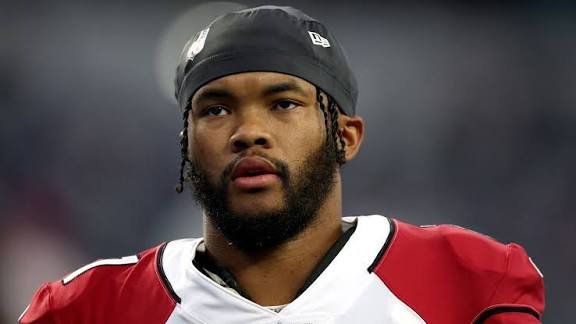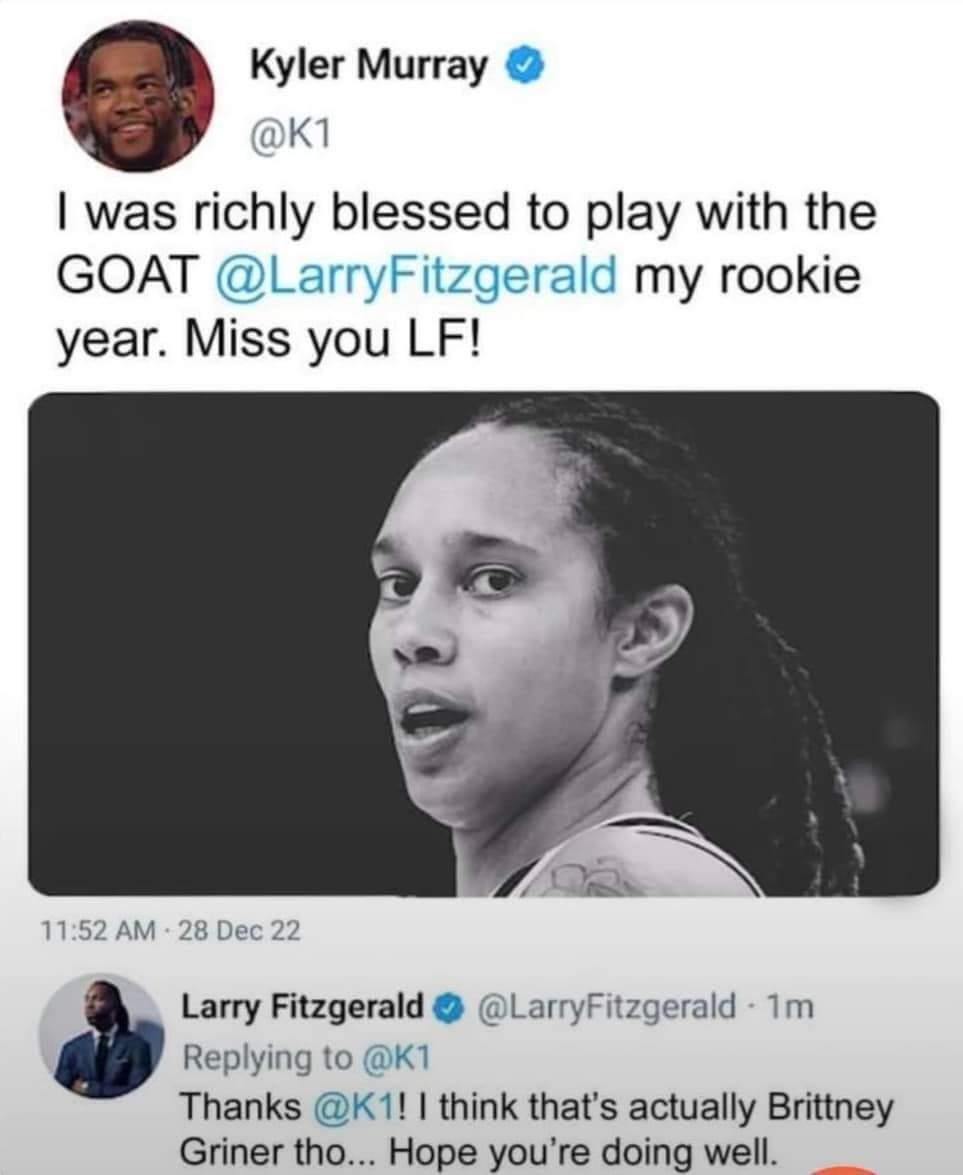
Introduction

In modern sports, nationality and heritage often play roles as significant as athletic performance. Athletes don’t just represent teams; they carry with them stories of origin, identity, cultural blends, and sometimes controversies. This article explores Kyler Murray’s nationality and South Korean heritage, and then looks at two other prominent athletes—Brittney Griner and Larry Fitzgerald—to draw comparisons in identity, representation, and impact. We’ll examine Murray’s background, what it means to embrace mixed heritage, and how Griner and Fitzgerald’s careers and life stories provide illuminating contrasts.
Kyler Murray: Nationality and South Korean Heritage
Early Life and Family Background
Kyler Cole Murray was born August 7, 1997, in Bedford, Texas, U.S. He is an American by birth and citizenship, but his heritage is more complex and globally rooted. His father, Kevin Murray, is African-American, a former standout collegiate quarterback for Texas A&M. His mother, Misun (often called Missy) Henderson, is of Korean descent—she is half Korean. This makes Kyler Murray one-quarter Korean through his maternal grandmother.
How He Embraces His Korean Heritage
Murray has not shied away from acknowledging his Korean lineage. A visible sign is the South Korean flag decal that appears on his helmet when he plays for the Arizona Cardinals. This small but meaningful symbol is his tribute to his Korean roots and maternal line. He has spoken in interviews about learning about Korean culture—stories, traditions, food, and the influence of his mother and grandmother.
Nationality vs Ethnicity: Clarifying
It’s important to distinguish between nationality and ethnicity. Murray is an American national. His ethnicity is mixed: African-American and Korean. Ethnicity refers to cultural heritage, ancestral background, and identity, while nationality is legal citizenship or country of birth. In Murray’s case, his nationality is U.S.A., but his ethnic identity includes Korean heritage. Some confusion online arises because the presence of the South Korean flag on his helmet has led people to wonder whether he holds dual citizenship or if he is “Korean” in nationality. To date, publicly available information confirms U.S. citizenship; nothing suggests dual nationality.
Brittney Griner: Identity and Life
To offer a contrast, Brittney Yevette Griner is an American basketball player known for her exceptional physical attributes, style of play, advocacy, and distinct identity.
Early Life and Career
-
Born October 18, 1990, in Houston, Texas.
-
Attended Nimitz High School in Houston, played basketball (and volleyball earlier). She made a name for herself early by dunking frequently—an extraordinary feat in women’s basketball.
-
Went to Baylor University (2009-2013), where she led Baylor to the 2012 NCAA National Championship during a perfect season (40-0).
Professional Career and Challenges
-
Drafted #1 overall in the 2013 WNBA draft by the Phoenix Mercury.
-
Has multiple WNBA All-Star selections, defensive awards, scoring titles, etc.
-
Her identity is multifaceted—not just athlete but also activist. In 2022, she was detained in Russia on drug charges (possession of hash oil cartridge), sentenced to nine years, and later released via a prisoner swap.
Identity and Representation
Griner has been open about her identity: she is a tall, powerful Black woman, pinned early in her life by her physique and public perception. She has also spoken out on issues of social justice, inclusion, and what it means to be a non-typical athlete (in terms of height, gender norms, style, etc.). Her detention and freedom also put international and political dimensions onto her identity as a U.S. citizen and public figure. Her journey underscores how identity in sports is not just about heritage but also gender, race, and the geopolitics of representation. Kyler Murray nationality.
Larry Fitzgerald: A Legacy of Excellence and Service
Turning to Larry Darnell Fitzgerald Jr., we see a different type of identity—one built on performance, longevity, community, and consistency.
Early Life and NFL Career
-
Born August 31, 1983, in Minneapolis, Minnesota.
-
Played college football for the University of Pittsburgh. Excelled there, showing early signs of being one of the top receivers.
-
Drafted in 2004 by the Arizona Cardinals (3rd overall pick). Played for them a long time and became one of the NFL’s most prolific wide receivers.
Identity, Character, and Post-Playing Life
Fitzgerald is widely respected not only for his on-field achievements (receptions, yardage, clutch moments) but for his character. He established philanthropic efforts like the Larry Fitzgerald First Down Fund to help youth, community programs, etc. He is regarded as a role model—consistent in his conduct, committed to family and community.
His identity is shaped around perseverance, leadership, and service, rather than heritage or controversy. That said, representation matters: as a Black athlete, Fitzgerald has also been part of discussions around race, equality, and how sports figures can be influencers beyond the game.
Comparing the Threads: Heritage, Identity & Representation
Here are some comparative observations across these three athletes:
| Aspect | Kyler Murray | Brittney Griner | Larry Fitzgerald |
|---|---|---|---|
| Heritage / Ethnicity | Mixed: African-American / Korean descent | African-American | African-American |
| Nationality | American | American | American |
| Public recognition of heritage | His Korean flag decal, mother’s influence, embracing multiracial identity | Primarily recognised for gender, athletic excellence, activism; less emphasis on mixed heritage (not same mixed ethnic lineage) | Less discussion on mixed heritage; more focus on performance & character |
| Challenges faced | Navigating mixed identity, representation, expectations from sports community | Height & gender norms, political detainment, identity as a woman and queer athlete | Longevity, maintaining high performance, leadership roles off-field |
| Impact beyond sports | Raises visibility for Asian-American heritage in NFL; representation for mixed-ethnicity athletes | Activism, gender equality, penal system, LGBTQ+ issues, international politics | Philanthropy, youth development, positive public figure conduct |
What Does Nationality Mean for Athletes like Murray?
-
Identity Complexity: Murray’s case shows how modern identity can be multi-layered. Nationality (American) is distinct from ethnicity (African-American + Korean); both can co-exist without conflict.
-
Visibility & Representation: For many fans of Korean, Korean-American, or Asian-American descent, Murray’s heritage is a form of representation in a sport where there are few with visible Asian identity. The flag decal is symbolic in this sense.
-
Cultural Legacy: Murray seems to draw pride and influence from his maternal heritage, which suggests that nationality alone does not define identity; culture, storytelling, family, and ancestry do.
-
Public Perception & Misconceptions: Because of symbolism (flag decal) or articles, there can be misunderstandings (e.g. people might assume dual citizenship, etc.). Correct, clear coverage is essential. Kyler Murray nationality.
Lessons from Griner and Fitzgerald
-
Griner shows how personal identity (gender, sexuality, race, activism) can intersect with legal and political arenas. Her detainment and release underscore how national identity entails obligations and vulnerabilities (citizen rights, diplomacy).
-
Fitzgerald exemplifies sustained excellence and how identity may shift over time: early broadcaster of heritage and performance, later in philanthropy. Identity here becomes more about values, community, and legacy rather than roots alone. Kyler Murray nationality.
Conclusion
Kyler Murray’s nationality is unequivocally American, but his Korean heritage—through his mother and grandmother—adds richness and nuance to his identity. It shows how being “American” does not preclude having strong ties to other cultures. Comparatively, Brittney Griner and Larry Fitzgerald represent different facets of identity and representation: Griner with intersectional challenges and advocacy, Fitzgerald with consistency, leadership, and character. All of them illustrate that sports transcend just winning games—they are about identity, representation, legacy.
FAQs
Q1: Is Kyler Murray a South Korean citizen?
A: No. Public records indicate Kyler Murray holds U.S. citizenship. His connection to South Korea is through his mother’s side—his maternal grandmother is South Korean, and his mother is of Korean descent. There is no verified information showing he holds dual citizenship. Kyler Murray nationality.
Q2: Why does Kyler Murray wear the South Korean flag on his helmet?
A: The flag is a symbolic gesture. It’s a way to honour his Korean heritage, particularly his maternal family lineage, and to represent a part of his identity publicly.
Q3: How has Brittney Griner’s nationality and identity impacted her career?
A: Griner is American; her identity has impacted her career in multiple ways beyond her athletic performance—through activism, social justice, LGBTQ+ issues, her detainment in Russia (which had diplomatic implications), and representation as a tall, powerful female athlete. Also, her nationality made her subject of international negotiations and public attention during her detention.
Q4: What is Larry Fitzgerald known for, beyond just being a great player?
A: Beyond his impressive NFL stats, Fitzgerald is known for his philanthropy (First Down Fund, community work), character, leadership, being a mentor, and his contributions off-the-field. He represents what many consider the archetype of a professional athlete who balances performance and positive personal values. Kyler Murray nationality.
Q5: How do these athletes influence representation for minorities and mixed-heritage individuals in sports?
A: Each in their way expands what the public sees as “normal” in sports. Kyler Murray visibly embracing Korean heritage offers mixed-heritage and Asian American youth a broader sense of belonging in the NFL. Brittney Griner’s journey challenges gender, sexuality, and physical norms. Larry Fitzgerald’s long and respected career demonstrates that excellence and integrity matter. Their stories help broaden public perceptions of identity in sports.
